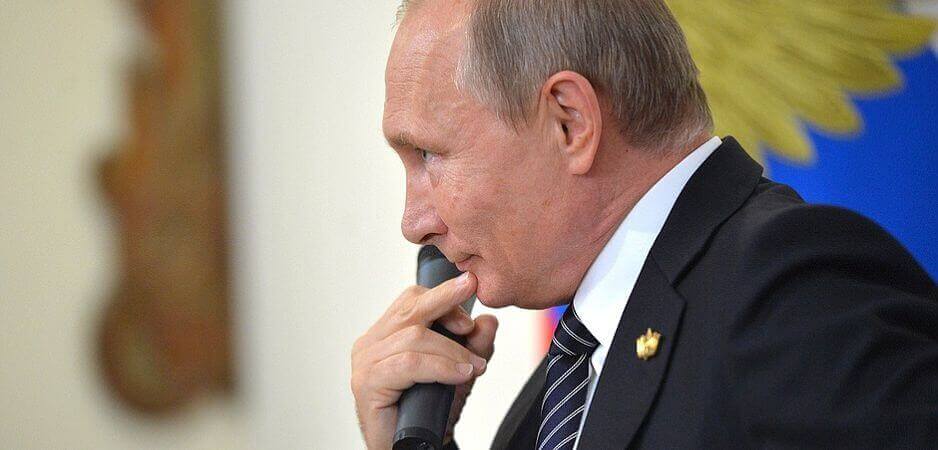If the Kremlin makes counterterrorism its cause in the upcoming election, the people may well rally—just not around the flag.
In the two weeks since anti-corruption protests broke out across Russia, the Kremlin has made clear that it intends to fight back. Youth, the vanguard of the March 26 demonstrations, and social media, on which demonstrators organized themselves despite a media blackout, have come under severe government pressure, which is likely to intensify as the state enacts new counterterrorism measures following the tragic events of April 3. Indeed, the government’s response to the attack in Saint Petersburg offers some insight into its plan for suppressing Russia’s reinvigorated opposition as the 2018 presidential election nears, a plan that is far from perfect.
The Kremlin has reason to be concerned. Since March 26, the electability of anti-corruption crusader Alexei Navalny has risen, with Levada Center finding every 10th Russian voter at least willing, if not determined, to vote for him in next year’s presidential election. By contrast, a mere 5% of the electorate had considered electable Navalny, whose investigation into Prime Minister Dmitry Medvedev’s secret assets led to the March 26 protests, a month before. Medvedev, on the other hand, saw his approval rating fall by 10% in that same month.
Navalny has also become far more visible: Up to 55% of Russians now know of him, a considerable achievement given that the mainstream media in Russia tends to ignores his activities altogether. Moreover, polling data suggests that the government’s attempt to discredit the protests by accusing its organizers of paying youth to attend has only convinced 24% of Russians, with 38% of Russians holding a favorable view of the demonstrations.
Russian youth, the face of the anti-corruption protests, have borne the brunt of the government’s counteroffensive. In the classroom, students and schoolchildren across the country have been accosted in what educators call an effort to prevent “extremism”: a Tomsk teacher called children in his class “betrayers, traitors, and liberal-fascists”; a Samara teacher verbally and physically assaulted a pupil who interrupted a presentation about “extremism”; and a Moscow student was removed from a lecture and threatened with legal action should she continue taking part in protests.
More worryingly, the security services have stepped in to make clear the costs of dissent. The families of youth who demonstrated have been subject to intimidation by Federal Security Service (FSB) and Investigative Committee (SKR) agents, who have demanded that some relatives come in for questioning and told others that anti-government activities may endanger their children’s chances of going to university. In Nizhny Novgorod, five parents of schoolchildren detained at protests were charged with neglecting their child-rearing duties.
 Other actions have underlined the state’s appreciation of the role of social media in mobilizing Russian youth. Russia’s federal parliament may soon be presented with legislation banning “children under the age of 14 from creating accounts on social media and [requiring] adults to use their real names, verified with passport information, when registering with any social media platform,” as reported by Global Voices. An important forum for political debate on the Russian internet that recently relocated its servers to Russia, LiveJournal declared on April 4 that users would no longer be able to post “political solicitation materials” without permission from the website.
Other actions have underlined the state’s appreciation of the role of social media in mobilizing Russian youth. Russia’s federal parliament may soon be presented with legislation banning “children under the age of 14 from creating accounts on social media and [requiring] adults to use their real names, verified with passport information, when registering with any social media platform,” as reported by Global Voices. An important forum for political debate on the Russian internet that recently relocated its servers to Russia, LiveJournal declared on April 4 that users would no longer be able to post “political solicitation materials” without permission from the website.
In combination with the omission of anti-government material from search results generated by news aggregator websites, effectively required under a recent law, the de-politicization of LiveJournal suggests the Kremlin is seeking to reduce the number of online spaces—where “the revolution is happening,” as Levada Center’s Denis Volkov said at a recent Sakharov Center panel discussion—where the Russian opposition can mobilize supporters. In addition, it appears the presidential administration has resolved to make television, its medium of choice for disseminating propaganda and one that Russians are losing trust in, a more effective means of shaping public opinion as the 2018 presidential election nears.
SAINT PETERSBURG ATTACK
This week’s terrorist attack, carried out in the Saint Petersburg metro on April 3, has further complicated the challenge of securing national support for another term for President Vladimir Putin. On the one hand, the government has found a cause around which to rally the people: vanquishing terrorism, something that only Putin can do, his supporters may assert. On the other hand, deploying such a narrative may prove to be counterproductive.
A “rally around the flag” effect seems to have been the intended outcome of the rallies held on April 6. Indeed, unity—political, religious and otherwise—was greatly emphasized. In Saint Petersburg, leaders representing various faiths stood “together against terror” (the rallies’ slogan) and, in Moscow, a vast swath of Russia’s parties and political movements was represented: from the ultra-nationalist movements NOD and SERB to the parliamentary parties United Russia, LDPR and Just Russia.
That an image of unity was created with some success is noteworthy in light of the absence of opposition parties at the anti-corruption protests—the result of the demonstrations’ close association with Navalny, who has come to blows with opposition leaders Mikhail Kasyanov and Grigory Yavlinsky. The office of Sergey Sobyanin, Moscow’s mayor, called the capital’s rally a “non-political” event when explaining its exemption from rules concerning the organization of political rallies.
Granted, mourning the victims of a terrorist attack, especially one perpetrated in Russia’s cultural capital, is not an inherently political act. But many details suggest that the rallies were, in fact, politically motivated. In Moscow, the decision to use Manezhnaya Square, sandwiched between Red Square and the parliament building, as the rally’s location hints at an attempt to conflate solidarity against terrorism with solidarity with the Russian government. Other reasons for doubting the rallies’ alleged spontaneity include the fact that some people were paid to attend, a charge leveled at the organizers of the March 26 protests; that other outpourings of grief were essentially staged by pro-Kremlin activists; and that forms for some rallies, including one in Tula, were filed after March 26 and before April 3.
To be sure, that is not to imply the government organized, or allowed to occur, the April 3 attack. Rather, it gives reason to believe that counter-rallies were organized by the government after March 26, and that the tragic events of April 3 provided it with a more resonant cause in the name of which to mobilize Russians.
Commentators fear the rallies may be presented as a sign of the government’s mandate to curtail freedoms in the name of counterterrorism. Introducing measures like last year’s Yarovaya law would serve not just national security needs, but also regime security needs, with the latter back at the top of the Kremlin’s agenda. One of the founders of the Anti-Maidan movement, which has committed itself to preventing a Maidan-like revolution from below in Russia, was tasked with shaping United Russia’s ideological message on April 5; Putin recently compared the March 26 protests to the unrest seen during the Arab Spring and Maidan; and Vyacheslav Volodin, speaker of Russia’s parliament, has said that Navalny “sings with the voice of Western security services.”
However, as analysts note, each successive terrorist attack perpetrated inside Russia undermines the appeal of this social contract, whereby freedoms are given up in return for security. As articulated by Carnegie’s Andrey Pertsev, future failures to prevent acts of terrorism may lead people to ask: “What did seventeen years of security concerns get us?” Similarly, as Carnegie’s Alexander Baunov has noted, each attack contradicts the claim, popular among propagandists, that the lack of restraints placed on Russia’s national security apparatus keeps Russia from becoming as vulnerable to terrorism as European states are.
“WASTE TERRORISTS”
In fact, an emphasis on security from terrorism in the upcoming presidential election may simply remind Russians that Putin has failed to carry out his famous promise, made as prime minister, to conclusively “waste [terrorists] in the outhouse,” as one analyst told Kommersant. Since April 3, terrorism has loomed large in the minds of Russians. In that time, an attack on National Guard units in Astrakhan has been carried out and claimed by the Islamic State; an explosion in Rostov-on-Don was misperceived as an act of terrorism despite being the work of a jealous man; an additional bomb has been found and defused in Saint Petersburg; and the collapse of part of a Saint Petersburg building’s façade alarmed the city’s residents, who feared another attack was taking place.
That the government is allowing a terrorism scare to take hold is uncharacteristic. In the past, Russia’s mainstream media have said little about violent incidents believed to be linked to the Islamic State—from the killing of an infant by her nanny in Moscow to an attack on traffic police just outside of the capital.
Allowing Russians to become as paranoid about terrorism as some Western societies are is political dynamite, not just because of Putin’s 17-year-old promise to end the threat of terrorism, but also because of his role in keeping Russia’s borders open to Central Asian migrants. The more terrorists hail from that region, as the Saint Petersburg bomber did, the more Russians will come to ask why the country’s immigration policy remains at odds with its national security needs. Ironically, it may simply benefit Navalny, who has long advocated making Central Asian migrants apply for visas in order to enter Russia.
Such questions are anathema to the president, who appears set on running again in 2018. Although rallying Russians around the flag using the specter of terrorism sounds like a sure-fire way to suppress Russia’s opposition movement, it may yet come to benefit the opposition, with the curtailing of freedoms viewed as helping regime, but not national, security, and the maintenance of an open border with Central Asian republics a policy easily exploitable by terrorists. Judging by the anti-corruption protests’ impact on Navalny’s popularity and visibility, limiting the opposition’s activities to an increasingly regulated internet seems like the Kremlin’s best bet. Time will tell which path it pursues.
The views expressed in this article are the author’s own and do not necessarily reflect Fair Observer’s editorial policy.
Photo Credit: Kremlin
Support Fair Observer
We rely on your support for our independence, diversity and quality.
For more than 10 years, Fair Observer has been free, fair and independent. No billionaire owns us, no advertisers control us. We are a reader-supported nonprofit. Unlike many other publications, we keep our content free for readers regardless of where they live or whether they can afford to pay. We have no paywalls and no ads.
In the post-truth era of fake news, echo chambers and filter bubbles, we publish a plurality of perspectives from around the world. Anyone can publish with us, but everyone goes through a rigorous editorial process. So, you get fact-checked, well-reasoned content instead of noise.
We publish 2,500+ voices from 90+ countries. We also conduct education and training programs
on subjects ranging from digital media and journalism to writing and critical thinking. This
doesn’t come cheap. Servers, editors, trainers and web developers cost
money.
Please consider supporting us on a regular basis as a recurring donor or a
sustaining member.
Will you support FO’s journalism?
We rely on your support for our independence, diversity and quality.






